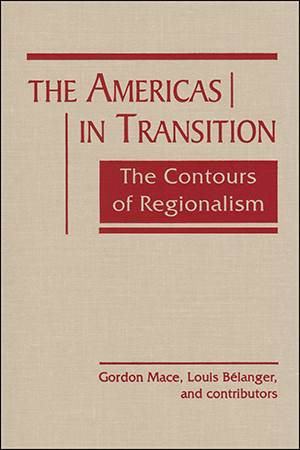The FTA, MERCOSUR, the Enterprise for the Americas Initiative, NAFTA, the Summit of the Americas—do these constitute building blocs in the construction of a new regional system? This book explores that question, offering an assessment of the state of regionalism in the Americas.
The authors first outline the regionalist project—which they view as essentially a U.S. initiative—and analyze the environment in which it has evolved. They then focus on the reactions and strategies of the various actors involved.
The final chapter of the book seeks to articulate the present contours of regionalism in the Americas and to identify future trends.
Gordon Mace is professor in the Department of Political Science and the Graduate Institute of International Studies at Laval University. He is also director of the Research Group on International Relations at Laval. His recent publications include Foreign Policy and Regionalism in the Americas (coedited with J.P. Thérien). Louis Bélanger is assistant professor of political science at Laval. He is coauthor of Trente ans de politique extérieure du Québec, 1960-1990.
"This book is well worth reading, offering a useful theoretical contribution and adding to the empirical literature on regionalism and inter-American affairs."—Sean W. Burges, International Affairs
"A valuable contribution to the understanding of hemispheric integration."—Marjorie Woodford Bray, American Political Science Review
"Offers a well-considered overview of the origins, nature and scope of the hemispheric project as well as the strategic interests of state and nonstate actors.... The configuration of a new North American geo-political space is well underway. The Americas in Transition is necessary reading for anyone who wants to understand this process better."—Janine Brodie, Canadian Journal of Political Science
"A fine collection of essays.... The Americas in Transition goes beyond the dominant pro-free trade analysis of regional integration while introducing political variables and political forecasting."—Mario E. Carranza, Journal of Interamerican Studies and World Affairs
"Without exception the essays are of high quality."—John S. Robey, Perspectives on Political Science
"This excellent book makes an important contribution to the scholarly debate on the new regionalism in the Western Hemisphere."—Choice
"An excellent and timely primer on the status of hemispheric integration in the Americas, and on the major issues confronting it."—Frederick W. Mayer






